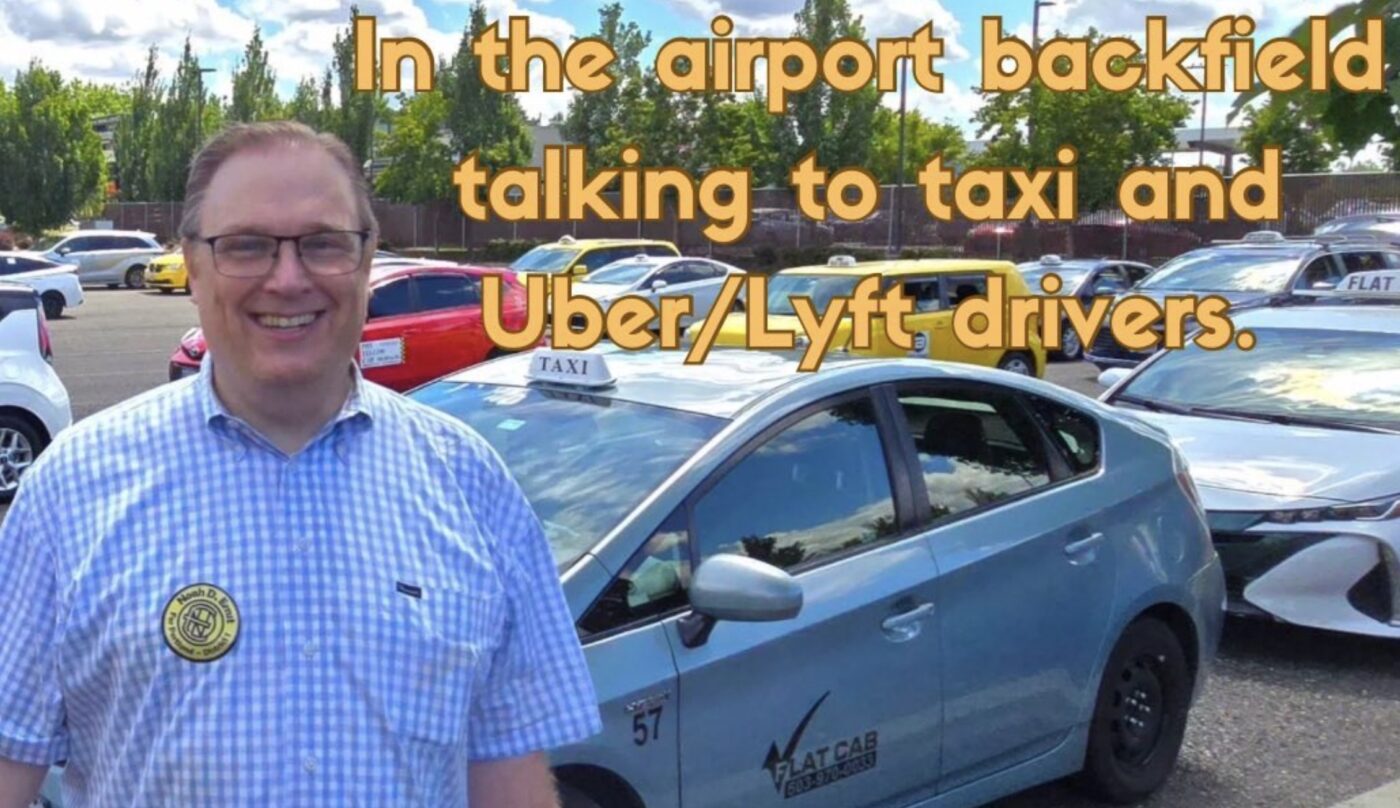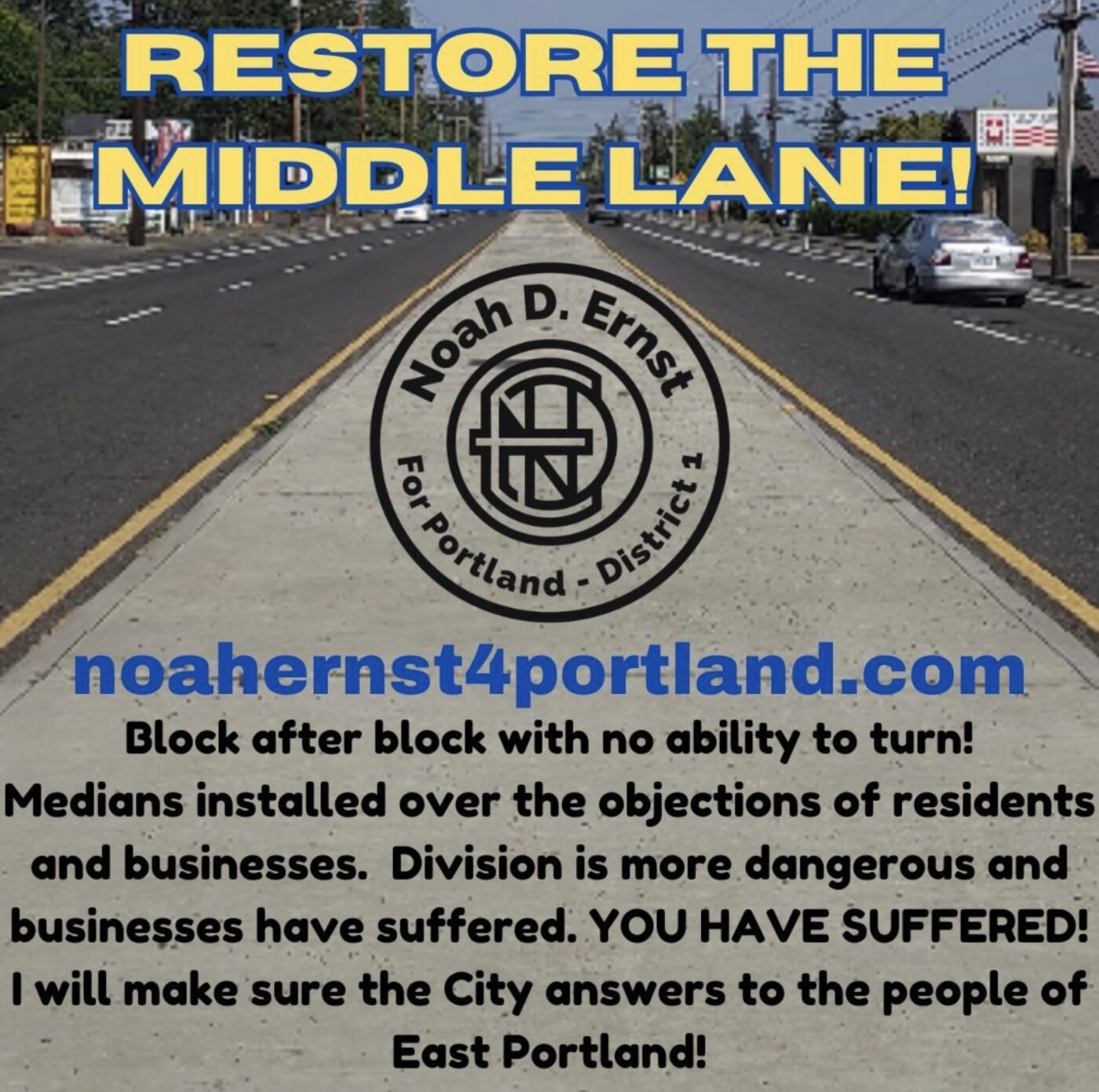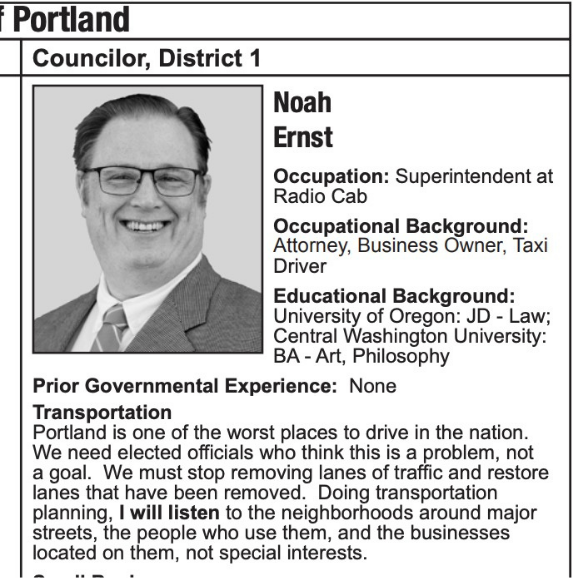
I’ve been tracking City Council District 1 candidate Noah Ernst since this past spring — ever since he started posting about transportation on his Instagram account. Now that Ernst has picked up an endorsement from The Oregonian and was just in the news for being hit by a drunk driver while operating his cab on Sunday, I figure it’s a good time to share a bit more about him.
According to a story by KGW and Ernst himself, he was on SW 15th crossing northbound onto W Burnside when someone plowed into him. Luckily it was relatively low speed and Ernst wasn’t seriously injured. The other driver was cited for driving under the influence.
It’s notable that Ernst was involved in a traffic collision because he’s by far the most outspoken critic of Portland’s approach to traffic safety among the 100 or so candidates running for City Council. “I don’t know if it’s ironic,” Ernst told KGW. “It’s certainly incredibly frustrating, but at the same time, at least, I can use myself as an example to say, ‘Look how badly things are going. Look how we need to make changes we need to make the city of Portland and better place a safer place’.”
I don’t know the details of how the collision happened, but Ernst might take solace in the fact that the Portland Bureau of Transportation just lowered the speed limit on W Burnside to 20 mph in the segment where he was hit (between 2nd and 24th). I know a lot of people dismiss speed limit decreases without enforcement; but making a marquee street like Burnside the same maximum speed as a residential neighborhood street is a pretty big deal!
I think we need more critics like Ernst in order to have a healthy debate about our approaches to difficult problems like how to tame east Portland arterials and eliminate the fatal crashes that plague them. I also think it’s interesting Ernst believes the solution to safer streets and preventing crashes like the one he was in, is to make driving easier and to encourage more of it.



He wants to remove the center median recently installed on SE Division because he alleges it has made the street more dangerous and has hurt businesses. He says PBOT road designs have caused too much congestion for drivers and laments that Portland is ranked one of the “10 worst cities to drive in.” Ernst doesn’t use “war on cars” rhetoric like one of his competitors in District 1, Terrence Hayes, but he clearly believes PBOT’s approach is too hard on car users.
On a recent episode of the NW Fresh Podcast, Ernst responded to a statement from the host that too many decisions in Portland cater to a, “very small, vocal, loud segment” of the population. “My favorite example of that,” Ernst eagerly replied. “Is there is a bicycle committee that advises PBOT on literally every transportation plan that they introduce… And bicyclists make up less than 5% of the commuters. But 80 plus percent of the commuters on a daily basis are in cars — yet they have no input at all in any way on a committee level or anything else in transportation policy that’s being adopted by PBOT.”
Ernst is a former cab driver and now works as legal counsel for a cab company, so it’s easy to see where some of his interests lie. But it should be said that he either doesn’t understand how PBOT and their advisory committees work and/or he’s willfully misleading District 1 voters to make a political point.
PBOT has three transportation advisory committees: bicycling, pedestrian and freight. I’ve attended all three of them many times over the past two decades (especially the bicycling one, which I rarely miss). One of the chief complaints of the bike committee is that it has almost no influence over PBOT, much less any influence in City Hall. The freight committee is the one that really throws its weight around. Unlike the other two committees whose members are unpaid individuals, freight committee members are mostly professionals from freight-related businesses or advocacy groups who are being paid to attend the meetings (it’s chaired by Oregon Trucking Association President Jana Jarvis, arguably the most influential transportation advocate in the state).
And while Portland doesn’t have a Driving Advisory Committee, the freight committee does a great job advocating for pro-driving policies. They are staunchly supportive of wider driving lanes and regularly advocate for pushing bicycle users off main roads and onto side streets. That’s the same position Ernst likes to take. And for what it’s worth, the vast majority of bicycle committee members are also drivers (the idea that Portlanders can be divided up into mode labels is convenient for political stump speeches, but has no basis in reality). It’s also a fact that PBOT planners and engineers have a “design vehicle” for every project they build — a vehicle they consider when determining routes, turning radii, lane widths, and so on. Their design vehicle for road projects is an Ford F150 truck.
On the east Portland arterials where we suffer the majority of our fatal crashes — including four this past week alone — Ernst wants driving to be easier and faster. “What PBOT refers to as ‘high crash corridors’ are simply the main arteries that most of us use on a daily basis to get around Portland,” Ernst has said on the campaign trail. “While PBOT attempts to characterize those streets as especially dangerous, the truth is (all things being equal) we would expect that 74% of accidents would occur where 74% of the traffic is. These streets are not necessarily especially dangerous, they are just especially busy. For good reason. They are the most efficient routes.”
Ernst believes it’s possible to improve conditions for drivers and still make roads safer for everyone. He says we’d save lives by cracking down on impaired and speeding drivers during late night hours. “Impeding the smooth and efficient flow of traffic on main thoroughfares during our daily commutes won’t address that problem. Increased traffic enforcement during those hours will,” he writes.
In the voter pamphlet, the statement from Ernst reads: “Portland is one of the worst places to drive in the nation. We need elected officials who think this is a problem, not a goal. We must stop removing lanes of traffic and restore lanes that have been removed.”
I appreciate that Ernst is thinking and speaking about these issues. Unfortunately, his positions on transportation are clouded by his profession and his own preference for driving. It’s wishful to think Portland can provide free-flowing traffic for everyone who wants to drive and simultaneously grow the number of people who choose not to. And thinking we can simply shift the responsibility for safe driving onto the shoulders of police and enforcement is a nice idea; but the reality is our street designs must carry most of the enforcement load.
And promoting the idea that there’s some cabal of bike activists nefariously pulling strings at PBOT and City Hall undermines the good work of a lot of volunteers dedicated to safer streets. And it simply doesn’t match reality.
One final word about Ernst’s comment on PBOT advisory committees: I’ve said many times over the years that I wish we had a Driving Advisory Committee or some sort of driving advocacy group because it would enrich the debate and remove the ability of people like Ernst to imply drivers’ perspectives aren’t being heard. I also think it would allow us to fully air out these debates and I believe we arrive at better outcomes when we embrace healthy discussions among people who disagree — instead of trying to shut them down.
See you on the streets Noah!



